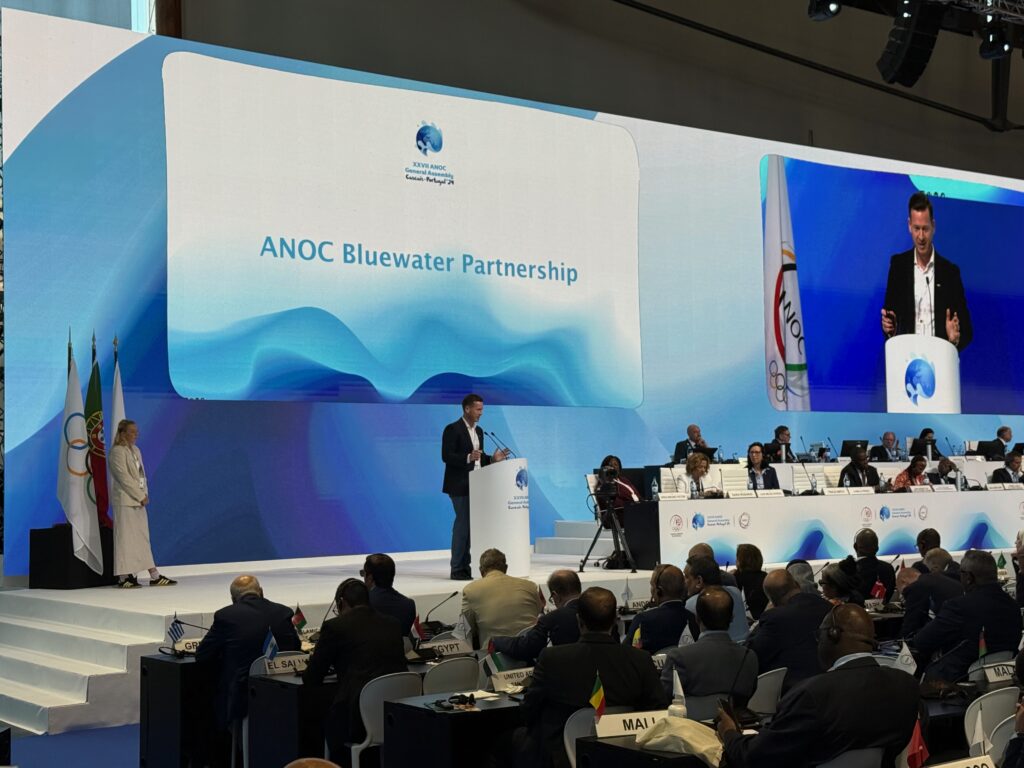LONDON, UK. November 1st, 2024 – At this week’s 27th General Assembly of the
Association of National Olympic Committees (ANOC), Swedish water purification innovator Bluewater issued a powerful call to action urging the Olympic Community to adopt transformative hydration solutions for tackling declining tap water quality and the ongoing damage caused by single-use plastic pollution.
The address coincided with the announcement of a new four-year partnership between ANOC and Bluewater, built on a shared commitment to champion advanced technology solutions for water purification to create sustainable, accessible, and health-focused drinking water delivery for sport globally.
“Access to clean and sustainable drinking water is fundamentally intertwined with the international sporting community”, said Philip Russell, Chief Purpose Officer at Bluewater Group.
“Athletes can’t train and compete effectively without proper hydration, and now with the worrying trend of contaminants appearing in municipal tap water supplies and the growing concerns related to the health impacts of micro-plastic pollution, there is an urgent need to evolve our approach by which we provide drinking water for athletes, teams, staff and volunteers.”
For over a decade, Bluewater has innovated and pioneered industry-leading water purification systems that remove over 99% of contaminants from locally available water supplies, thereby eliminating the need to ship in pre-bottled water from remote locations. Heavy metals, parasites, viruses, micro-plastics, and toxic chemicals like PFAS are effectively removed by Bluewater’s reverse osmosis technology, before the locally purified water is then remineralised and chilled to create a balanced and delicious water refill solution. Bluewater refillable bottles, constructed from premium stainless steel and warrantied to last a lifetime, then offer the perfect accessory to enjoy high-quality and sustainable drinking water while ending the reliance on polluting single-use plastics.
Welcoming the new partnership, Gunilla Lindberg, ANOC Secretary General said: “ANOC is committed to sustainability and to providing a platform for National Olympic Committees to share and exchange best practice on this critical subject. We recognise that technologies are fast evolving and we are excited by the scope of Bluewater’s water purification solutions for athletes, staff events and venues. Our partnership with Bluewater will help us in achieving our own pledge to minimise our carbon footprint while promoting effective pathways to avoid plastic pollution.”
Global trust in tap water quality is declining. A 2024 study published in Nature Communications found that more than half of adults sampled across 141 countries anticipated serious harm from their drinking water in the next two years. This declining trust in tap water is driving unsustainable reliance on plastic bottled water. Some 600 billion plastic bottles are consumed around the world annually.
Yet as reported by the United Nations Development Programme, scientists estimate that only approximately nine percent of all the plastic waste generated globally is actually recycled. The majority of plastic waste is landfilled, incinerated, or leaches out into the natural environment polluting our lakes, rivers, oceans and food system. Medical researchers continue to also raise alarms regarding concerns over potential health impacts linked to ingestion of micro-plastic particles and associated chemical contaminants.
Highlighting these trends during Bluewater’s plenary address at the General Assembly, Philip Russell told delegates that Bluewater’s business mission is to transform access to clean and sustainable drinking water globally by leveraging innovative technology solutions. “We stand at a pivotal moment for the future of our planet and the health of our athletes,” he said.
“Through this exciting new partnership with ANOC, we can help pave the way for a healthier, more sustainable approach to drinking water delivery that respects both our bodies and our environment.”
Bluewater is joined at this week’s General Assembly by Global Bluewater Brand Ambassador Ellie Aldridge, who recently secured her debut Olympic Gold Medal in Women’s Kite at the 2024 Paris Games. Racing across the world’s oceans, Ellie has first-hand seen the disastrous impact of single-use plastic pollution on marine health and now works with Bluewater to raise awareness and drive change for more sustainable hydration practices across all of sport. A showcase of Bluewater purification and dispensing solutions have been installed at the Cascais conference venue in order to allow General Assembly delegates to experience the pioneering solutions in person and to enjoy the locally purified and mineralised drinking water.
Through this new partnership with ANOC, Bluewater aims to inspire athletes and sports organisations to adopt more sustainable practices, utilise refillable water bottles, and embrace a culture of mindful hydration. Together, the two organisations will work to change perceptions about tap water safety globally, demonstrating that it can be a clean and convenient reliable source of hydration for sport if first processed with appropriate point-of-consumption purification technologies.
ENDS

